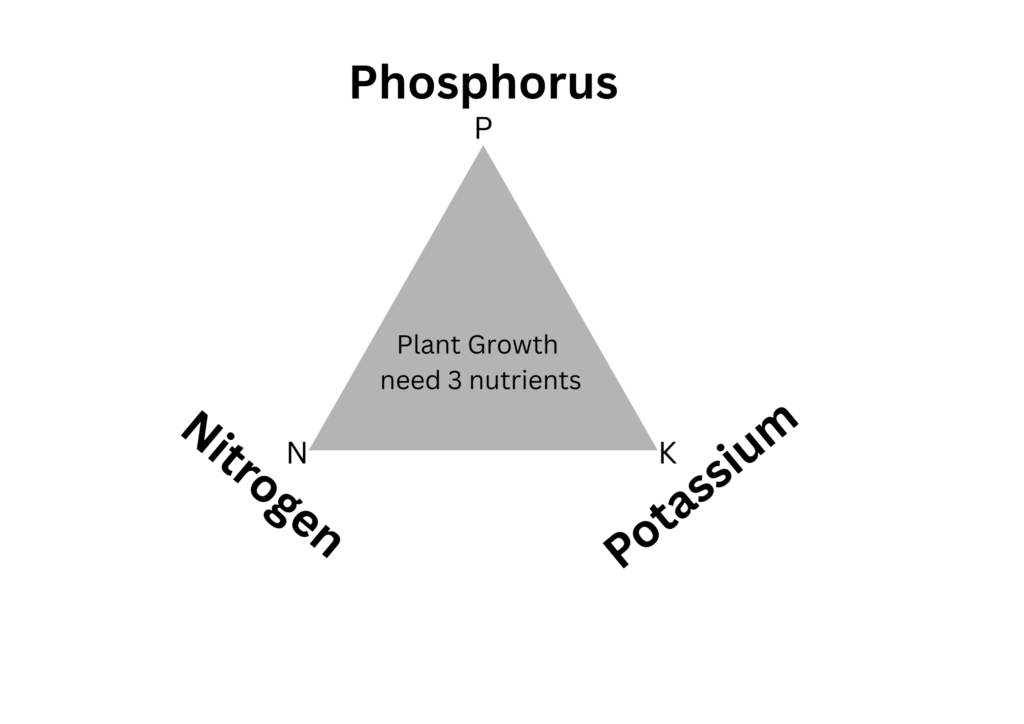Introduction NPK:
Ever since I began my gardening journey, I’ve been fascinated by the phrase NPK. Everywhere I looked, it popped up — NPK compositions, the perfect NPK mix for tomatoes, the NPK balance spinach thrives on, or even the idea that some plants don’t need much ‘P’ from the NPK trio. It felt like NPK was the secret code behind plant growth, and I wanted to crack it.
Here it is, what i understood, just like humans need a balanced diet of carbohydrates, proteins, and vitamins to stay healthy, plants too require their own essential nutrients. Among all the nutrients, three stand out as the most important for plant growth: Nitrogen (N), Phosphorus (P), and Potassium (K). Together, they are called NPK — the foundation of every plant’s diet.
Whether you’re tending to vegetables on your terrace or managing acres of farmland, understanding NPK is the first step towards growing strong, healthy, and productive plants.
What is NPK ?
- N – Nitrogen 🌿
Nitrogen promotes leafy growth and helps plants produce chlorophyll, which is essential for photosynthesis. A plant rich in nitrogen grows tall and lush with healthy green leaves. - P – Phosphorus 🌸
Phosphorus supports strong root development and plays a vital role in flowering, fruiting, and seed production. Without enough phosphorus, plants may grow but fail to bloom or produce good harvests. - K – Potassium 🍅
Potassium strengthens overall plant health. It improves disease resistance, regulates water within plant cells, and enhances the taste, size, and quality of fruits and vegetables.
Together, NPK forms the primary macronutrients — nutrients that plants require in the largest amounts.
Why is NPK Important for Plants ?
- Balanced Growth – Ensures not only green leaves but also healthy roots, flowers, and fruits.
- Better Yields – Provides good quantity and quality harvests.
- Stress Resistance – Potassium helps plants withstand drought, pests, and temperature fluctuations.
- Soil Health Indicator – Testing soil for NPK levels guides gardeners and farmers in choosing the right fertilizer.
In short, without NPK, plants cannot thrive.
Natural Sources of NPK:
Chemical fertilizers supply NPK, but organic sources offer the same nutrients while improving soil health. Here are some natural ways to provide NPK:
- Nitrogen (N): Cow dung, poultry manure, composted kitchen waste, green manure, and legume crops (beans, peas).
- Phosphorus (P): Bone meal, rock phosphate, fish meal, banana peels.
- Potassium (K): Wood ash, banana peels, coconut husk compost, comfrey tea.
At Parkkruthi, we focus on sustainable organic options like Organic Manure, Coco Peat Compost, and Cow Dung Powder — all rich in essential nutrients to boost soil fertility naturally.
Signs of NPK Deficiency in Plants:
- Nitrogen Deficiency: Yellowing of older leaves, slow growth, weak plants.
- Phosphorus Deficiency: Stunted roots, delayed flowering, purplish or dark leaves.
- Potassium Deficiency: Brown edges on leaves, weak stems, poor fruit and flower development.
By recognizing these signs early, you can correct the nutrient imbalance and save your plants.
Achieving the Right NPK Balance:
Always test your soil before adding fertilizers.
Avoid over-fertilizing, as too much of one nutrient can harm plants.
Choose organic slow-release fertilizers like compost, manure, and natural amendments — they nourish plants steadily and improve long-term soil health.
Conclusion on need of NPK:

NPK is the nutrition triangle every plant depends on. Just as we need a balanced diet to stay healthy, plants need the right mix of nitrogen, phosphorus, and potassium for growth, flowering, and productivity.
By using natural and organic sources of NPK, you’re not only feeding your plants but also nurturing the soil and protecting the environment.
🌿 Start with the soil, and healthy plants will always follow!